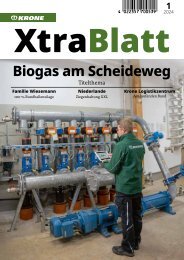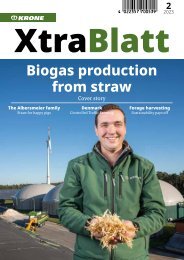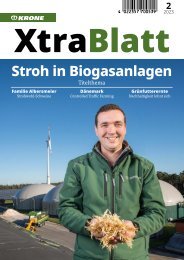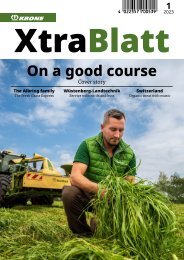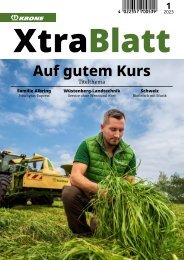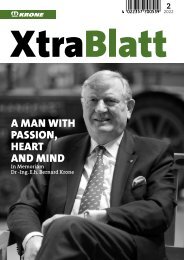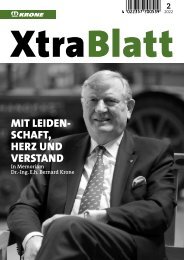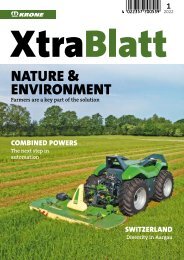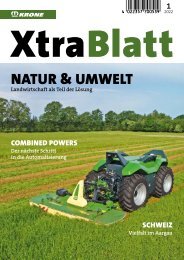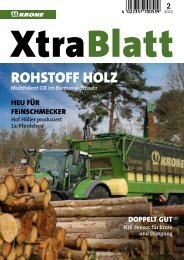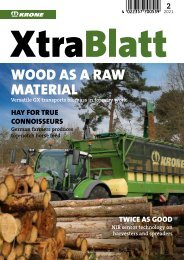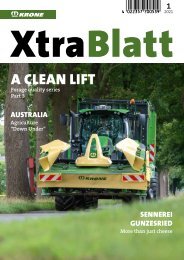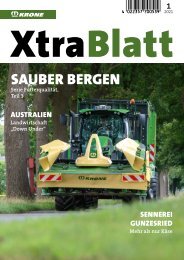XtraBlatt Issue 02-2020
Create successful ePaper yourself
Turn your PDF publications into a flip-book with our unique Google optimized e-Paper software.
INTERVIEW<br />
dentist, or accountant? Probably not! This is why at this<br />
point I would like to appeal for more understanding of the<br />
dealership situation. Nowadays the services involved have to<br />
satisfy customer – and industry – demands that are spiralling<br />
upwards regarding the required know-how levels of our teams<br />
and naturally the reliability of the machinery after service.<br />
But these external costings are only one side of the coin. What<br />
dumps an almost greater load on our member companies are<br />
the payment rates for guarantee and warranty work. After<br />
all, one third of paid workshop hours are so called internal<br />
hours. Of these, almost a quarter are down to guarantee and<br />
warranty work. And this is where not a few dealerships stand<br />
just at the brink of disaster. Those paying just 35 € or 40 €<br />
per mechatronics hour and then asking for a reduction in the<br />
hours on the invoice, and maybe also on travel costs too, have<br />
– pardon me – totally lost touch with reality. As a rule, the<br />
manufacturer should be responsible for any gaps in guarantee<br />
and warranty cover. It cannot be the problem<br />
of the service partner if new products are<br />
rushed onto the market increasingly faster<br />
with the trials carried out beforehand fewer<br />
and fewer. Those who cause the problems in<br />
this respect must shoulder the responsibility.<br />
<strong>XtraBlatt</strong>: Does the problem lie with all<br />
makes, in your experience?<br />
Kopplin: No. Here, there are certainly clear differences. The<br />
manufacturers of tractors and of harvest machinery have<br />
already done a lot of homework regarding guarantee costs.<br />
Certainly, there’s room for improvement here and there.<br />
But after long discussions we’ve achieved a lot, not least<br />
“THOSE WHO CAUSE<br />
THE PROBLEMS IN<br />
THIS RESPECT MUST<br />
SHOULDER THE<br />
RESPONSIBILITY.”<br />
ULF KOPPLIN<br />
encouraged by our regular membership surveys. In such<br />
questionnaires, we don’t just stick to queries on guarantee<br />
themes, but also on a whole series of different aspects at<br />
various levels. Incidentally, these questionnaires on dealership<br />
satisfaction with their manufacturer suppliers are not only<br />
carried out nationally, but also on a European basis. Using<br />
the responses allows us to make step-by-step<br />
improvements in our cooperation.<br />
<strong>XtraBlatt</strong>: You explicitly mentioned tractors<br />
and harvest machinery. What can you say<br />
about the implement manufacturing<br />
sector?<br />
Kopplin: Here lies the greatest need for<br />
improvement on the subjects I’ve already<br />
discussed. This is why in spring 2<strong>02</strong>0 we conducted an appropriate<br />
survey with around 180 dealerships taking part in<br />
Germany alone. The differences in the results for individual<br />
manufacturers were sometimes substantial. On the other<br />
hand, a few makes, such as Krone and Horsch, came through<br />
with marks clearly above the average, putting them right at<br />
the top of total ranking. For companies where this was not<br />
the case, there are acute grounds for discussions.<br />
their trading partners as, for example, does Krone. With<br />
smaller dealers, there arises the question at some point if,<br />
under their own resources, the total effort required in sales<br />
and service, whether for tractors or implements, will continue<br />
to be worth it. As always, this depends on the individual<br />
situation and expectations. But for businesses dealing with<br />
only implements, I don’t see much of a future. After all, their<br />
workshops have to support the respective firm with enough<br />
income. And this depends on machine population and a good<br />
basic level of equipment in the workshop. Mostly, this doesn’t<br />
work out without self-propelled machinery on sale. In trading<br />
and servicing, I also see a future for complete packages. As<br />
specialist enterprises, we must be allowed to earn money in<br />
trade, despite the pressures on margins through structural<br />
change.<br />
<strong>XtraBlatt</strong>: Is the training for skilled dealership staff able to<br />
keep up with the technical developments in the industry?<br />
Kopplin: This is certainly one of the greatest challenges of<br />
our time and one of the core tasks for our association. The<br />
fact is, the vocational education and training structures do<br />
not everywhere keep up with technological progress. This<br />
doesn’t only apply to the master mechanic in the companies<br />
but just as much the examination committees, the schooling<br />
and training regulations, the chambers of crafts and trades<br />
and the technical colleges. Because of the foreseeable and,<br />
even now sometimes, acute shortage of teachers, my greatest<br />
fear currently lies with the schools.<br />
But we too, must react here. For instance, giving extra<br />
encouragement for the integration of more electronics and<br />
digitalisation in training. This is why I’m especially pleased<br />
that the LBT was last year one of the candidates from 176<br />
applicants from many branches to be awarded funding for<br />
a support project in the Federal Ministry of Education and<br />
Research (BMBF) innovation competition ‘InnoVET’. This<br />
triumph put us up amongst the leaders in the field and<br />
polished our professional image – a good sign.<br />
<strong>XtraBlatt</strong>: What does the support project entail?<br />
Kopplin: Very briefly, the core idea is the further development<br />
of vocational education and training of specialist and<br />
management personnel for agricultural and construction<br />
machinery engineering with a focus on the digital changes<br />
and increasing automation. We hope the result will increase<br />
the attractivity of professional education for existing and future<br />
generations of specialist personnel in this work. After all,<br />
at the risk of repeating myself, the dealerships and, above all,<br />
the many committed colleagues involved are the performance<br />
providers in our branch, and in the relationship between<br />
industry and customers. Let us hope that this remains so!«<br />
Ulf Kopplin values very highly the standard of knowledge and qualifications of<br />
agricultural and construction machinery mechatronic engineers compared to that in<br />
other technology branches.<br />
<strong>XtraBlatt</strong>: Can a dealer in farm machinery earn a living from<br />
one implement manufacturer alone, i.e. without tractors<br />
and combine harvesters?<br />
Kopplin: I believe this would be difficult. I can, however,<br />
certainly imagine that on many farms, tractors actually play a<br />
secondary role. The really big players in trading have no choice<br />
but to accept the exclusivity demanded by the long liners<br />
over the whole product range. The medium sized category<br />
of dealerships , companies like those of our members, are in<br />
a good position with tractor and implement manufacturers<br />
when the makes traded are well positioned on the market,<br />
and the manufacturers involved also give good support to<br />
THE LANDBAUTECHNIK-BUNDESVERBAND* …<br />
... is an association of company owners<br />
in the skilled labour and specialised dealership<br />
sector. Nationally, it represents<br />
some 4,500 businesses, dealerships and<br />
service firms on approx. 5,700 locations<br />
with almost 44,000 employees and a<br />
total annual turnover of 9 bn Euro. The<br />
association is organised on a federal<br />
basis comprising the respective federal<br />
guild association, the 40 LandBauTechnik<br />
guilds and the 10 state associations. At<br />
national level, the federal association<br />
coordinates overriding specialist themes,<br />
organises congresses, exhibition presentations,<br />
and – through its own academy<br />
– a comprehensive schooling and<br />
seminar system. It also prepares work<br />
aids, information services and advises<br />
companies and regional associations.<br />
With six manufacturer societies and the<br />
Federal Specialist Group for Motorised<br />
Machinery, the association represents the<br />
interests of dealerships with the industry.<br />
It is also internationally linked within<br />
the European association for the branch:<br />
CLIMMAR.<br />
*THE NATIONAL AGRICULTURAL MACHINERY AND EQUIPMENT DEALERS AND REPAIRERS ASSOCIATION IN GERMANY<br />
52 53



